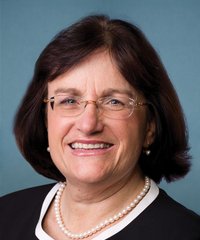
Annie Kuster was born and raised in Concord, New Hampshire to a family that taught her the values of kindness and empathy. Growing up, Annie helped her late mother, State Senator Susan McLane, who served in the NH House and Senate for over 25 years and was a pioneer for women in New Hampshire politics. Through that experience, Annie gained an appreciation for the good that government can do for communities and people, and a deep desire to help create positive change for Granite Staters. Her late father, Malcolm McLane, was Mayor of Concord, a New Hampshire Executive Councilor, and served as a prominent attorney for over 50 years.
Kuster is a member of the House Energy and Commerce Committee, where she serves on the Health Subcommittee, Energy Subcommittee, and the Oversight & Investigations Subcommittee. She is also a member of the House Agriculture Committee, where she serves on the Nutrition, Oversight, & Department Operations Subcommittee, Commodity Exchanges, Energy, & Credit Subcommittee, and Conservation & Forestry Subcommittee.
I firmly believe that government governs the best when it does so within its means. We must make fiscally responsible decisions so we can continue to afford critical investments in our future. By cutting wasteful spending, streamlining duplicative programs, and finding inefficiencies throughout government, we can reduce the deficit in a balanced way that protects priorities such as education, research, and health care.
I am committed to working with Republicans and Democrats in Congress to curtail excessive spending, close tax loopholes, and end wasteful subsidies. If both parties come together to focus on finding creative solutions instead of dwelling on ideological disagreements, we can reduce the deficit, get back to balanced budgets, and continue to move our country forward.
That is why I support the following common sense reforms:
I am also a cosponsor of legislation (H.R. 530) to help the government save billions of dollars, cut wasteful spending, and consolidate duplicative programs. The bipartisan Government Waste Reduction Act would advance a series of expert waste-cutting recommendations that were included in recent Government Accountability Office reports but were never acted on by Congress.